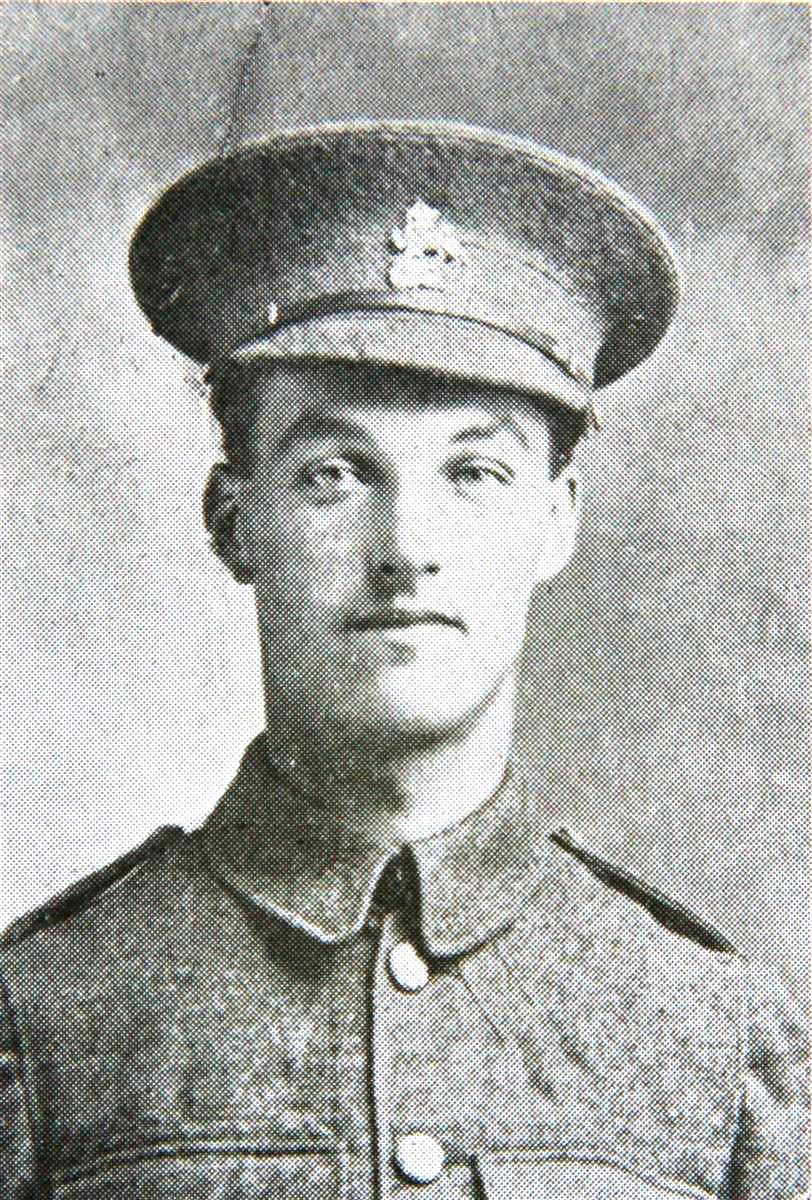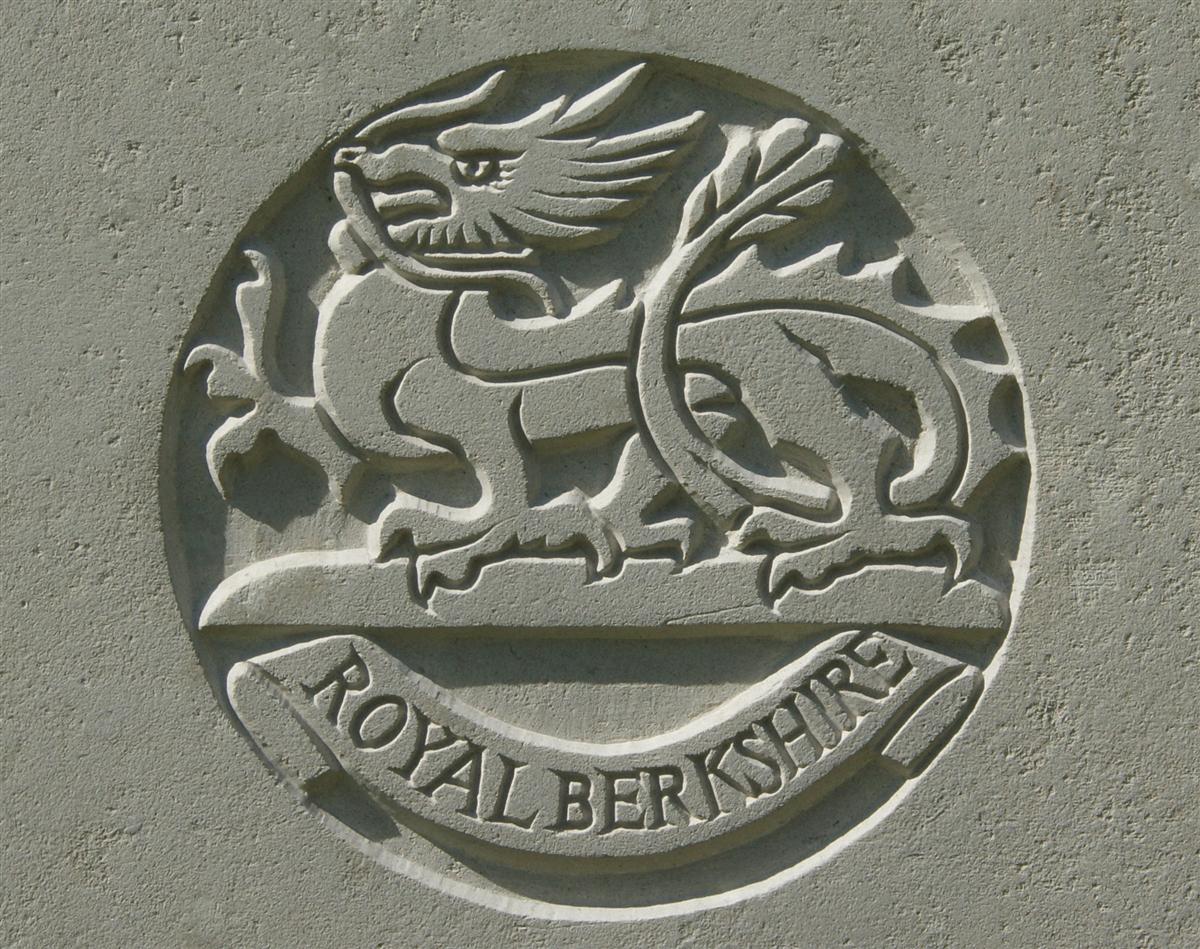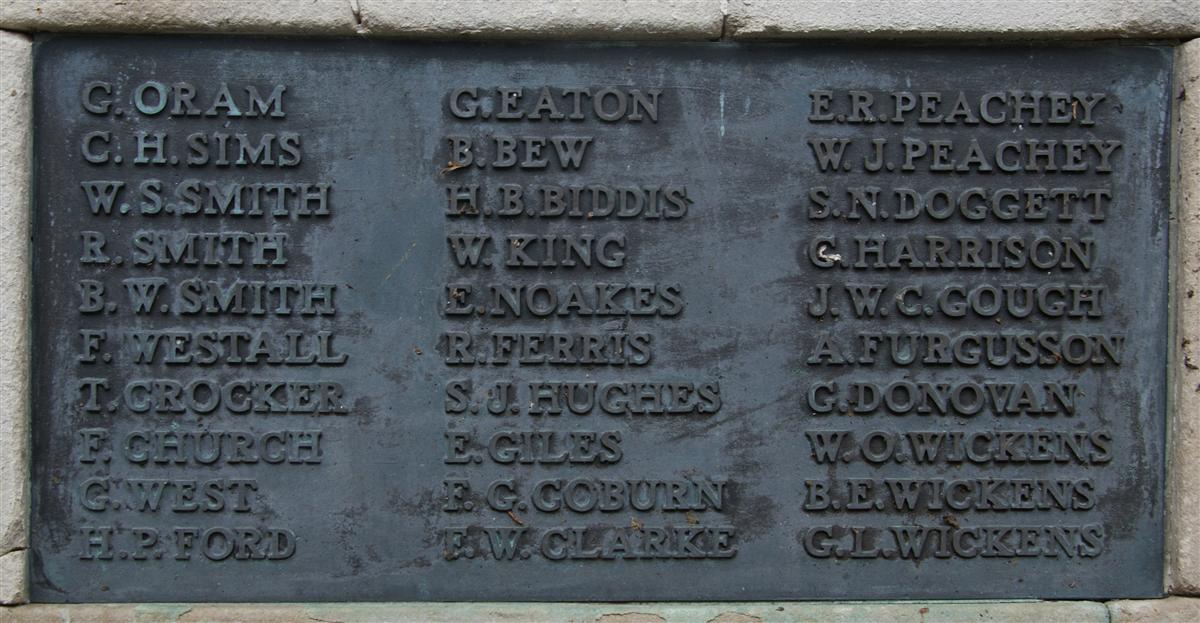Frank Church
Private 18527 Frank Church, 8th Battalion, Royal Berkshire Regiment
 Frank Church |
In 1911 Frank married Beatrice Wedge in Paddington, which was Beatrice’s home since her birth in 1887.
When war was declared in August 1914 Frank was not among the hundreds of thousands of young men who responded before Christmas to War Minister, Lord Kitchener’s appeal for a new army to fight their country’s foe. However, he did not wait to be conscripted; he enlisted in London in June 1915 and elected to serve with the Royal Berkshire Regiment and was posted to their 9th Battalion, one of the new battalions being raised as part of the new army. The 9th Battalion was never sent abroad, instead it became a Reserve battalion training new recruits and sending them to replace losses in the various Royal Berkshire battalions abroad. On 4 October the war diary of the 8th Battalion recorded losses of over 500 men so far in the ongoing Battle of Loos; replacements were desperately needed. Frank landed in France on 9 September with a draft of replacements, it is likely that he was among the 52 men who joined the 8th Battalion on 4 October. On the following day the battalion moved forward to relieve the 8th Royal Fusiliers in the reserve trench (the old German front line). On 9 October they moved further forward into the firing line (the old German third line) relieving the 9th Royal Fusiliers and 10th Sussex Battalions. On 13 October they prepared for an assault on the German positions:
War diary, 13 October 1915, 8th Battalion, Royal Berkshire Regiment.
1.0pm. Precisely at 1.0pm the chlorine gas discharge began, and was continued at intervals until 1.50pm. During this time smoke bombs were thrown out by our men from the front line trench. The wind seemed very favourable and carried the gas and smoke towards the enemy trench. 1.50PM. The gas discharge ceased, the artillery lifted, and the Battalion wire-cutters accompanied by men carrying smoke bombs went forward under cover of the smoke.. During the whole time of the smoke discharge hostile machine gun fire from our right flank could be heard. 2.0PM. The remainder of the two companies in the front line went over. From reports I have since received it appears that about only six of these men reached the Estimate across the road owing to heavy machine gun fire from the right flank which seemed to come from the directions of the CHALK PITS. These men remained at the Estimate until dark and then crawled back. 2.10Pm a report reached me that our first line had attained the road but were being enfiladed. I then ordered two platoons of the supporting companies to go over. As these crossed our first line, the Machine Gun Officer, with his team joined them. This Officer reports that by this time the smoke was beginning to thin, and that his team had got out about 75 yards beyond our parapet when they came under machine gun fire and were cut down. From inquires I have made from NCOs it appears that about fifteen men of this line reached the road but didn’t cross it. They report that there was little rifle fire from the German trench. Hand grenades were thrown at them from the enemy’s trench, but these fell short by about ten yards. 2.20PM. The remainder of the Battalion went over, but they were no more successful than the others in reaching their objective. During the night these men who had escaped crawled back to our front line trench. I attribute the failure of the attack to the inability of our artillery to silence the German machine guns, and to the complete absence of support. 2nd Lieuts L.A. KLEMANTASK; G.B.COOTE; R.S.P. Poynte; W.I. CLARKE; F.M. SUMPSTER and F. GARDENER joined them from the 9th Royal Berkshire Regiment.
The news reached Newbury:
Newbury Weekly News, 28 October 1915 – Killed in Action
CHURCH – Killed in action, somewhere in France between the 13th and 15th inst, Pte Frank Church, of the 8th Batt Royal Berks, the dearly loved and only son of Mrs A Church and the late Frank Church, of 3 Orts-road, King’s-road, Newbury, aged 24 – Deeply mourned.
More details were printed in the following edition:
Newbury Weekly News, 4 Nov 1915 – Local War Notes
Private Frank Church of the 8th Royal Berks, succeeded in surviving the terrible charges in which the battalion took part, and then met his death from the bullet of a German sniper. He was killed on October 13th. He was a Newbury lad, son of Mrs A Church, and the late Mr Frank Church, of Orts-road, King’s-road. He had gone to live and work in London, but when the call came for men, he returned to his county and joined the Berkshires. He enlisted in June and trained with the 9th, but was drafted out to the 8th battalion in September. He was 24 years of age, and leaves a young wife.
Another Newbury soldier, Sergt Stanley Giddings wrote home describing his experiences during the attack:
Newbury Weekly News, 4 Nov 1915 – Local War Notes
“Each man carried a pick and shovel, so that we could commence to consolidate the first German trench immediately they got there. This line advanced well, and they got from 50 to 80 yards without a man falling. Then the Germans in the first-line trenches started pouring machine-gun fire into them, and they had to lie low. A good many were killed, but the greater proportion were wounded. I saw one of our officers who had been wounded in the throat (and afterwards died from it) lying down peppering the ‘Germs’ with a few revolver ‘pellets.’ He did some good work, and I know that all the boys of his company were very sorry to lose him. Another officer – a captain – was walking up the trench his company occupied, and was heard to say ‘Will you follow me, boys?’ The men answered with one voice, ‘We will follow you anywhere, sir.’ The next minutes they were over the parapet, and rushing towards the German lines. But the poor officer did not get 50 yards before he was riddled with machine-gun bullets. It put the devil into the men to see their captain fall, and they went for it with the determination to kill the Huns or die themselves in the attempt.”

The regimental badge of the Berkshire Regiment, as used on CWGC headstones. |
Reading Mercury, 13 November 1915 - The 8th Berks
It was the same old cry 'Come on the Berks' and over the top we went. When we got over, there was something waiting for us in the shape of German machine guns. They were continually sweeping the ground with them from one end of our line to the other. They fire from five to six hundred bullets a minute, so you can see it was pretty warm. When I got across to within 20 yards of the German trench, and as it was a bit too warm, I dropped down into a hole where a 'coal box' had fallen. There I had to lay, not daring to move so much as an eye lash, or it would have been my last move as there was a machine gun at work in front of me and snipers all round.
To make it worse they had spotted me, for they had taken several pots in my direction, but I kept a bit too low for them. I had to lay there for four hours till it got dark so that I could crawl back to our trench. When I did move I thought my back was going to break as I had been so cramped up. As soon as it began to get dusk I started crawling. I went backwards for the first 100 yards, watching the German trench all the time and then I turned round and had a go head first, expecting every minute to be made a pepper box of by bullets because they kept sending up 'starlights' and these made night as light as day. It took me two hours to cover 150 yards. But I thank God that I got back safely. To make it worse I had to lay beside dead comrades, one dying quite near me.
 Frank's name on Newbury War Memorial (lower left) |
Frank’s body was never identified; perhaps he lies in one of the thousands of graves marked 'Known unto God'. His name is commemorated on the Loos Memorial to the missing at Dud Corner Cemetery, near Loos-en-Gohelle.
Locally he is remembered on the Newbury Town War Memorial.
He was not forgotten by his family:
Newbury Weekly News, 12 October 1916 – In Memoriam
In loving memory of Pte Frank Church, killed in France October 14th, 1915, sadly missed by his sorrowing Wife, Mother, and Sister.
Newbury Weekly News, 11 October 1918 – In Memoriam
To the dear memory of Pte Frank Church, 8th Royal Berks, killed October 14, 1915.
While the light lasts I shall remember,
While darkness falls I shall not forget
From his Wife, Mother, and Sister.
Newbury Weekly News, 10 October 1918 – In Memoriam
To the ever dear memory of Pte F Church, of the 8th Royal Berks, killed in France October 14th, 1915.
When alone in our sorrow and bitter tears flow,
There stealeth a dream of a sweet long ago;
Unknown to the world he stands by our side
And whispers dear loved ones death cannot divide.
His dear Wife
Frank’s wife, Beatrice, remarried, on 6 September 1920 at St Judes Church, Kensal Green to Herbert Brooker a fish monger living at 94 Mount St, Mayfair. It seems that the marriage was childless; Herbert died in 1963 and Beatrice in 1977. His mother, Alice, died in 1940 aged 70; in 1921 his sister Winifred married Arthur James Whiting from Donnington, they had three daughters: Alice, Barbara and Eileen. Winifred died in 1989 aged 89.
Thanks to Karen Newbery for her help researching this family.

Find a memorial :
| Died this day: | |
| 02 March 1919 | |
| Ernest H H Youngs | |
| Theale |

Like this site? Show your appreciation through a donation to a great charity.